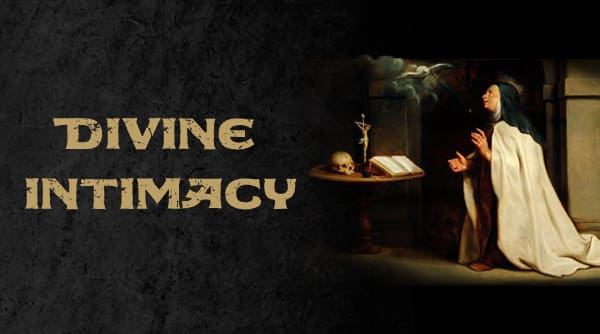God’s Infinite Goodness is Diffusive
Presence of God – O infinite Goodness, continually communicated to creatures, teach me how to imitate You.
MEDITATION
Goodness is not confined within itself; its characteristic is to diffuse itself, that is, to communicate itself to others, “bonum diffusivum sui,” good is diffusive of itself; the greater the good, the more it tends to diffuse itself. God is the supreme good; therefore, He diffuses Himself sovereignly. He diffuses Himself first in Himself, in the bosom of the Blessed Trinity: the Father communicates to the Son all His divinity—essence, life, goodness and divine beatitude; the Father and the Son together communicate this to the Holy Spirit. The mystery of the Blessed Trinity, the intimate life of God, consists precisely in this essential, total, unceasing, and absolute communication. In it we have the supreme expression of the axiom: “Bonum diffusivum sui.” Good is diffusive of itself.
But infinite Goodness wills to pour itself out exteriorly also; thus, God calls into existence an immense number of creatures to whom He communicates, in varying ways and degrees, some of His own goodness. God creates creatures, not because He has need of them, for they can add nothing to His beatitude and essential glory; but He creates them solely to extend His infinite goodness outside Himself. God wills creatures not because of any goodness or loveliness already in them, but because in creating them, He gives them a share in His own good and makes them lovable. God communicates Himself to creatures only because He is good and rejoices in sharing His good with other beings. His goodness is so great that it can communicate itself to an infinite number of creatures without being diminished; it is so diffusive that it makes all it touches good. This goodness is the cause of your being and of your life: when you were created, it left its imprint on you, and it is always and unceasingly penetrating and enveloping you. Has your heart retained the seal of the divine goodness? Examine your thoughts, feelings, actions and see if there shines in them the reflection of the infinite goodness of God.
COLLOQUY
 “O, eternal Father! O fire and abyss of charity! O eternal clemency, O hope and refuge of sinners! O eternal, infinite good! Have you any need of your creature? You must have since You act as if You could not live without her, You, the life of every creature, without whom nothing lives. Why, then, do You act in this way? Because You are in love with Your work, and You delight in it as if You were overcome with the desire of its salvation. Your creature flees from You and You go looking for her; she moves away, and You draw near. You could come no closer than You did when You took upon Yourself her humanity.
“O, eternal Father! O fire and abyss of charity! O eternal clemency, O hope and refuge of sinners! O eternal, infinite good! Have you any need of your creature? You must have since You act as if You could not live without her, You, the life of every creature, without whom nothing lives. Why, then, do You act in this way? Because You are in love with Your work, and You delight in it as if You were overcome with the desire of its salvation. Your creature flees from You and You go looking for her; she moves away, and You draw near. You could come no closer than You did when You took upon Yourself her humanity.
“What shall I say? I must cry with Jeremias: ‘Ah! Ah!’ because I cannot say anything else, my limited words cannot express the affection of my soul which so greatly desires You. I ought to repeat St. Paul’s words: ‘Tongue cannot tell, nor ear hear, nor eye see, nor hath it entered into the heart of man to know what I saw.’ What did I see? ‘Vidi arcana Dei,’ I saw the ineffable mysteries of God. And what can I say? I, with my dull feelings, can add nothing more; I only say to you, my soul, that you have tasted and have seen the abyss of the sovereign, eternal Providence. Now I thank You, O eternal, sovereign Father, for the unlimited goodness You have shown me, so wretched and unworthy of every grace.
“Can I ever thank You sufficiently for the burning charity which You have shown to me and to all creatures? No! But You, O sweet, loving Father, will be grateful for me, that is, the affection of Your charity itself will return thanks to You, for I am she who is not. If I said I could do something by my own power, it would not be true, for You alone are He who is. My being and all other good things have come from You, who give them to me unceasingly because You love me, and not because You owe me anything.
“O infinite goodness, inestimable love, wonderful are the marvels You have worked in Your rational creature!” (St. Catherine of Siena).
+
 Note from Dan: This post on God’s diffusive goodness is provided courtesy of Baronius Press and contains one of two meditations for the day. If you would like to get the full meditation from one of the best daily meditation works ever compiled, you can learn more here: Divine Intimacy. Please honor those who support us by purchasing and promoting their products.
Note from Dan: This post on God’s diffusive goodness is provided courtesy of Baronius Press and contains one of two meditations for the day. If you would like to get the full meditation from one of the best daily meditation works ever compiled, you can learn more here: Divine Intimacy. Please honor those who support us by purchasing and promoting their products.
Art for this post on God’s diffusive goodness: Saint Catherine of Siena, anonymous painter, 19th century?, PD-US author’s life plus 70 years or less, Wikimedia Commons. Father Gabriel of St. Mary Magdalen, mirror from open source material.




